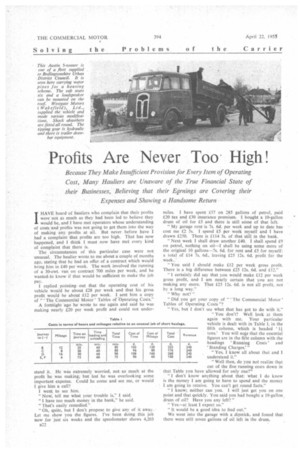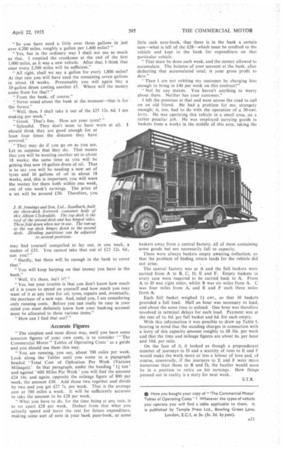Profits Are Never Too High!
Page 56

Page 59

If you've noticed an error in this article please click here to report it so we can fix it.
Because They Make Insufficient Provision for Every Item of Operating Cost, Many Hauliers are Unaware of the True Financial State of .their Businesses, Believing that their Eci rningS are Covering their Expenses and Showing a Handsome Return •
IHAVE heard of hauliers who complain that thcir profits were not as much as they had been led to believe they would be, and I have met operators whose understanding of costs and profits was not going to get them into the way of making any profits at all. But never before have I had a complaint that profits are too high. That has now happened, and I think I must now have met every kind of complaint that there is.
The circumstances of this particular case were not unusual. The haulier wrote to mc about a couple of months ago, stating that he had an offer of a contract which would bring him in £40 per week. The work involved the running of a 30-cwt. van on contract 700 miles per week, and he wanted-to know if that would be sufficient to make the job
I replied pointingout that the operating cost of his vehicle would be about £28 per week and that his gross profit would be about £12 per week. I sent him a copy of "` The Commercial Motor' Tables of -Operating Costs.
A fortnight ago he wrote to me again and said he was making nearly £20 per week profit and could not under
stand it. He was extremely worried, not so much at the profit he was making; but lest he was overlooking some important expense. Could he come and see me, or would I give him a call?
I went to see him.
"Now, fell me what your trouble is," I said.
"I have too much money in the bank," he said. "That's easily remedied."
"Oh, quite, but I don't propose to give any of it away. • Let me show you the figures. I've been doing this job now for just six weeks and the speedometer shows 4,203 B22 miles. I have spent £57 on 285 gallons of petrol, paid £20 tax and £30 insurance premium. I bought a 10-gallon drum of oil for £5 and there is still some of that left.
"My garage rent is 7s. 6d. per week and up to date has cost me £2 5s. I spend £5 per week myself and I have drawn £250. There is £114 5s. of that still in the bank.
" Next week I shall draw another £40. I shall spend £9 on petrol, nothing on oil—I shall be using some more of the original 10 gallons-7s. 6d. for rent and £5 for myself: a total of £14 7s. 6d., leaving £25 12s. 6d. profit for the week.
" You said I should make £12 per week gross profit. There is a big difference between £25 12s. 6d. and £12."
" I certainly did say that you would make £12 per week gross profit, and I am nearly certain that you are not making any more. That £25 12s. 6d. is not all profit, not by a long way."
" Why not?"
" Did you get your copy of "'The Commercial Motor' Tables of Operating Costs "?
"Yes, but I don't see what that has got to do with it," "You don't? Well look at them again with me. Your particular vehicle is dealt with in Table I, in the fifth column, which is headed ' tons.' You will note that the essential figures are in the first column with the headings 'Running Costs' and 'Standing Charges.'" "Yes, I know all about that and I understand it."
"Well then, do you not realize that out of the five running costs down in that Table you have allowed for only one?"
"I don't know anything about that: what I do know is the money I am going to have to spend and the money I am going to receive. You can't get round facts."
"I know; neither can you. I will just get you on one point and that quickly. You said you had bought a 10-gallon, drum of oil? Have you any left?"
" Yes—at least I expect so."
"It would be a good idea to find out."
We went into the garage with a dipstick, and found that there were still seven gallons of oil left in the drum.
"So you have used a little over three gallons in just over 4,200 miles, roughly a gallon per 1,400 miles?"
"Yes, but in the ordinary way I shall not use as much as that. 1 emptied the crankcase at the end of the first 1.000 miles, as it was a new vehicle. After that, 1 think that once every 2,500 miles will be sufficient."
• "All right, shall we say a gallon for every 1,800 miles? At that rate you will have used the remaining seven gallons in about 18 weeks. Presumably you will again buy a 10-gallon drum costing another L5. Where will the money come from for that?"
"From the bank, of course."
" Never mind about the bank at the moment—that is for the future."
"Well, then, I shall take it out of the £25 12s. 6d. 1 am making per week."
" Good. That's fine. How are your tyres? "
"Splendid. They don't seem to have worn at all. I should think they are good enough for at least four times the distance they have covered."
" They may do if you go on as you are. Let us suppose that they do. That means that you will be wanting another set in about 18 weeks; the same time as you will be getting that new 10-gallon drum of oil. That is to say you will be needing a new set of tyres and 10 gallons of oil in about 18 weeks, and, this is important, you will want the money for them both within one week, out of one week's earnings. The price of a set will be around £50. Therefore, you
J. H. Jennings and Son, Ltd., Sandbach, built the three-deck livestock container body of this Albion Clydesdale. The top deck is the roof of the second deck and has hinged sides. These fold down when not in use. The run-up to the top deck hinges down to the second deck. Dividing partitions can be adjusted to several positions.
may find yourself compelled to lay out, in one week, a matter of £55. You cannot take that out of £25 12s. 6d., can you?"
Hardly, but there will be enough in the bank to cover that."
" You will keep harping on that money you have in the bank."
" Well, it's there, isn't it?"
"Yes, but your trouble is that you don't know how much of it is yours to spend on yourself and how much you may want of it at any time for oil, tyres, repairs and, eventually, the purchase of a new van. And, mind you, I am considering only running costs. Before you can really be easy in your mind you must definitely know how your banking account must be allocated to these various items."
"How can I find that out?"
Accurate Figures "The simplest and most direct way, until you have some accurate figures of your own costs, is to consider ' " The Commercial Motor" Tables of Operating Costs' as a guide and you should use them this way.
" You are running, you say, about 700 miles per week. Look along the Tables until you come to a paragraph headed 'Total Cost of Opbration Per Week (Various Mileages).' In that paragraph, under the heading ton' and against '600 Miles Per Week' you will find the amount £24 14s. and again, opposite the mileage figure of 800 per week, the amount £30. Add those two together and divide by two and you get £27 7s. per week. That is the average cost at 700 miles a week. It will be sufficiently accurate to take the amount to be £28 per week.
" What you have to do, for the time being at any rate, is to set apart E.28 per week. Deduct from that what you actually spend and leave the rest for future expenditure, making some sort of note in your bank pass-book, or some little cash note-book, that there is in the bank a certain sum—what is left of the £28—which must be credited to the vehicle and kept in the bank for expenditure on that particular vehicle.
"That must be done each week, and the money allowed to accumulate. The balance of your account at the bank, after deducting that accumulated total, is your gross profit to date."
"Then I am not robbing my customer by charging him enough to bring in £40 per week on this contract?" " Not by any means. You haven't anything to worry about there. Neither has your customer."
1 left the premises at that and went across the road to call on an old friend. He had a problem for mc, strangely enough; it, too, had to do with the operation of a 30-cwt. lorry. He was operating this vehicle in a small area, on a rather peculiar job. He was employed carrying goods in baskets from a works in the middle of this area, taking the baskets away from a central factory, all of them containing some goods but not necessarily full to capacity.
There were always baskets empty awaiting collection, so that the problem of finding return loads for the vehicle did not arise.
The central factory was at A and the full baskets were carried from A to B, C, D, E and F. Empty baskets in every case were required to be carried back to A. From A to D was eight miles, whilst B was six miles from A. C was four miles from A, and E and F each three miles from A.
Each full basket weighed 14 cwt., so that 10 baskets provided a full load. Half an hour was necessary to load, and about the same time to unload. One hour was therefore involved in terminal delays for each load. Payment was at the rate of Is. 6d. per full basket and 6d. for each empty.
With this information it was possible to draw up Table I, bearing in mind that the standing charges in connection with a lorry of this capacity amount roughly to £8 16s. per week and that the time and mileage figures are about 6s. per hour and 10d. per mile.
On the face of it, it looked as though a preponderant number of journeys to D and a scarcity of runs to E and F would make the work more or less a labour of love and, of course, conversely, if the journeys to E and F were more numerous than those to B and D, the haulier would soon be in a position to retire on his earnings. How things panned out in reality is a story for next week.
S.T.R.




























































































